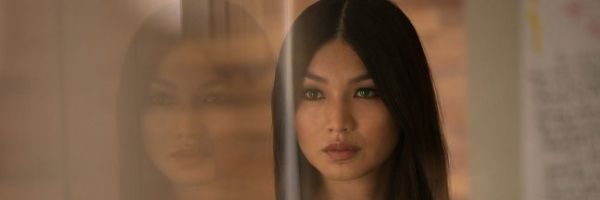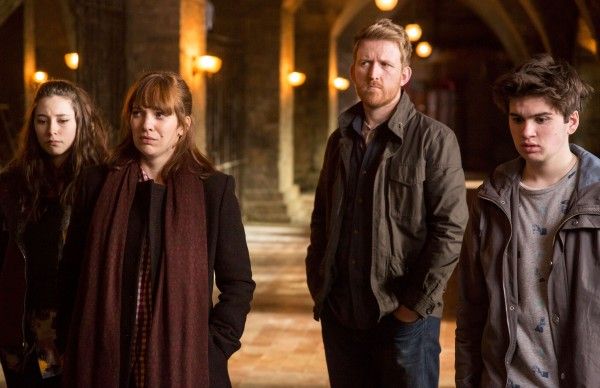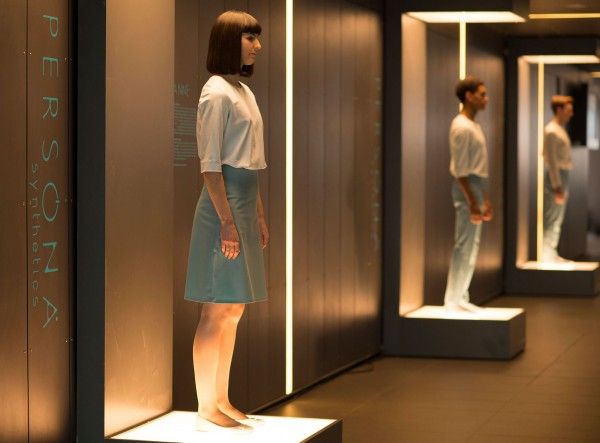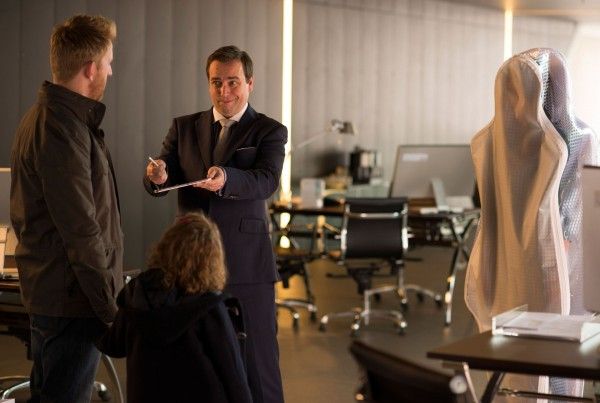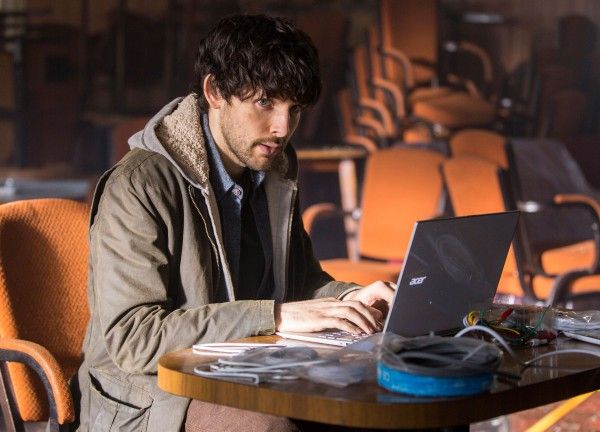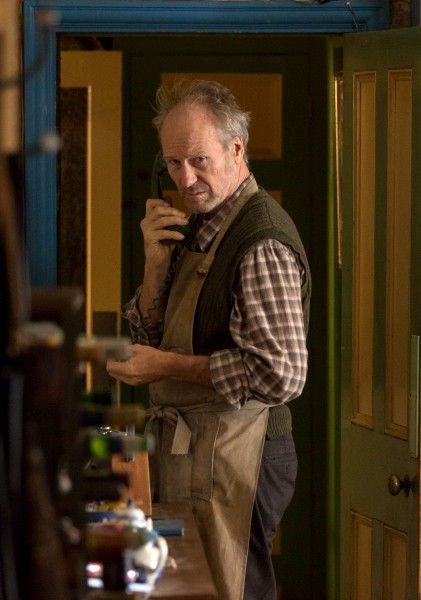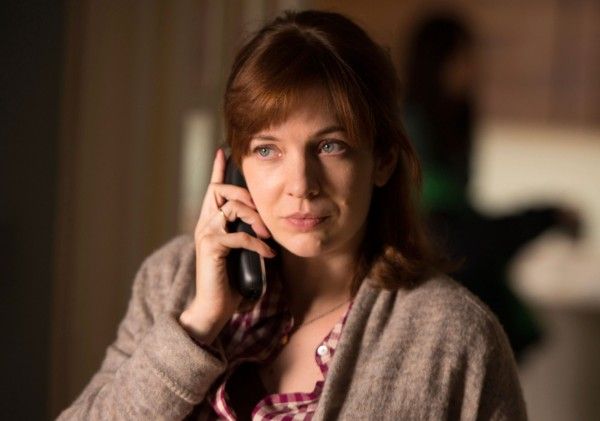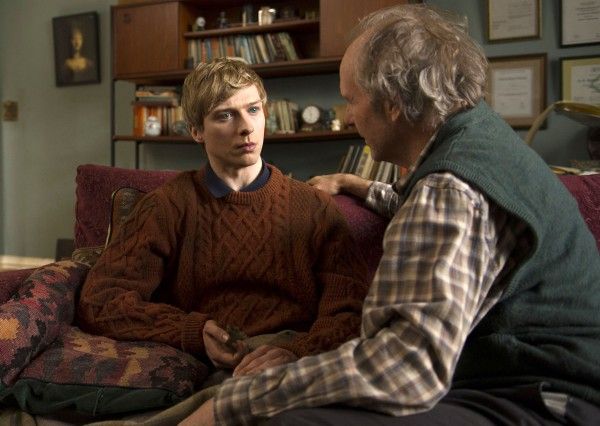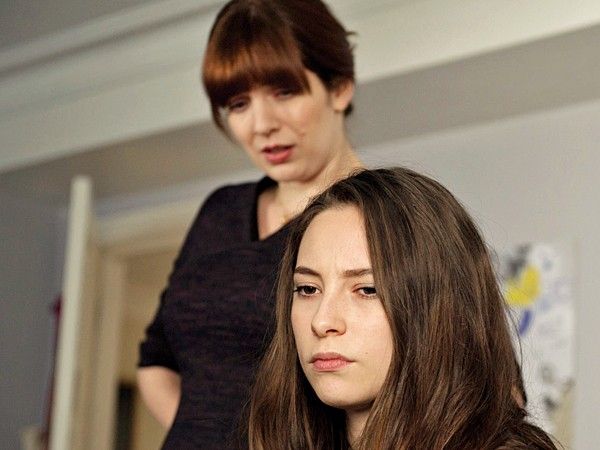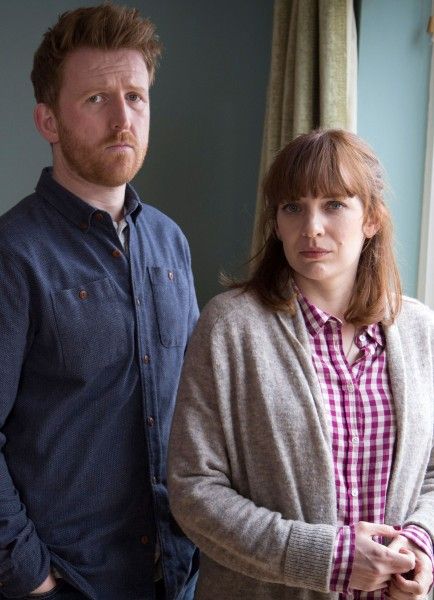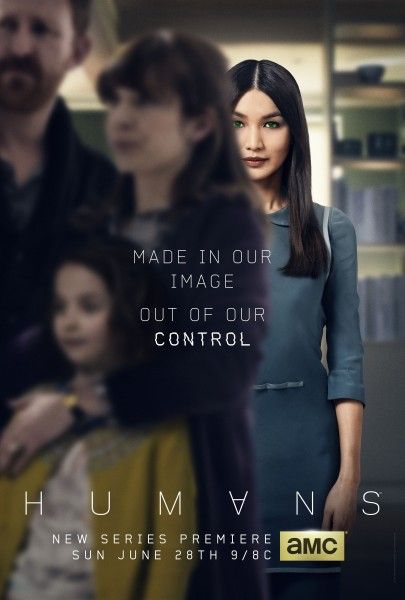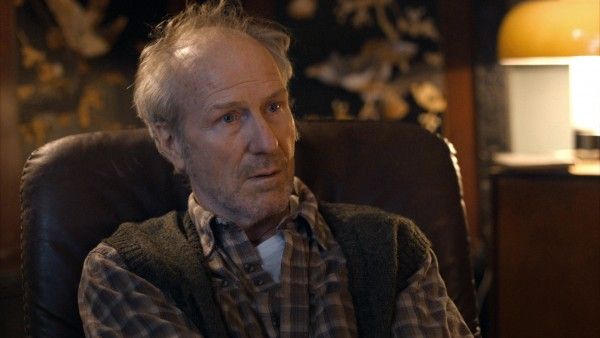The seven-part drama series Humans, from British writing team Jonathan Brackley and Sam Vincent and airing on AMC, explores the emotional impact of blurring the lines between humans and machines. The story takes place in a parallel present where the latest must-have gadget for any busy family is a Synth, which is a highly developed, artificially intelligent servant that is very similar to its living counterpart.
Jonathan Brackley and Sam Vincent, along with co-stars William Hurt, Katherine Parkinson, Tom Goodman-Hill and Gemma Chan, recently spoke with various press outlets about the series. During the interviews, they talked about how this show came about, how similar and different it is from the original Swedish version, the mix of genres, putting this cast together, artificial intelligence in our daily lives, rules for these robots, why some Synths are clearly different from the others, giving answers by the end of this season, and the possibility of future seasons. We’ve compiled a list of 26 things that you should know about Humans.
- This show came about when writers Jonathan Brackley and Sam Vincent were approached about doing their own take on the Swedish show, Äkta Människor, which translates as Real Humans. Said Brackley, “We were approached by the British production company that made the show, who we’ve worked with several times over the last two or three years, and they’d won the rights to remake the Swedish show and asked us if we were interested. We watched the original and it was so full of wonderful and fascinating ideas that we jumped at the chance because we thought we could bring our own take to it.”
-
When it came to developing their own version of the original Swedish show, Brackley and Vincent took some elements, especially in the beginning, but also brought new elements to it. Said Brackley, “I think we based most of our characters on characters, or amalgamations of characters, from the original Swedish show. Certainly, in the first episode, you see quite a lot of similarities in where the plot strands start. However, we take ours in a completely different direction. So, by the end of our series, all of our characters are in a completely different place to where they are in the Swedish show. Overall, our show is probably a bit darker than the original Swedish show. The material lends itself to exploring a darker, seamier side of humanity, and we were allowed to do that. The Swedish show was on a more mainstream network, and they couldn’t really do that.”
- The story is a real mix of genres, balancing emotional and ethical issues with the technical and scientific aspect of it. Brackley said, “That balance was a challenge. It’s a slightly unusual show because it has elements of genre in it, and there’s a thriller aspect, but it’s also very much a domestic and emotional drama. When we came to it, we wanted to explore the ensemble of characters and this world in a very 360-degree way, rather than focusing on one narrow aspect of it.”
- Although all of the ensemble stories are separate, at the beginning of the show, they will all converge, as the story progresses. They will all cross each other’s paths.
-
William Hurt was drawn to the project for the title, alone, but was intrigued when he dug deeper. “Initially, it was just the title, because that’s my topic, you know. And then, I realized that it was about human beings and machines, but still titled Humans, which was intriguing. It’s about a topic that I’ve been interested in, most of my life. And then, I started reading it and I realized it was full of character and good questions.”
- Vincent said that they wanted Hurt to be a part of the show because of the gravitas that he brings. “He is an intellectual himself, and I think that just bleeds through into his characters. It’s actually not that easy to find an actor who you feel could have done such world-changing, high level work. He brings a huge amount to that part.”
- Hurt said that he’s always been interested in science fiction and how possible much of it actually really is. “As I began to read important science fiction, most especially Isaac Asimov, and began to realize that it wasn’t anywhere near as much fiction as people were thinking, it fired my imagination to red hot. I just realized that what they were talking about was anything but imaginary. I was enthralled and always have been. And the thing about Humans that most interested me was the stance from which the questions about the whole subject are posed and asked. It’s not about what it’s going to be from a future standpoint. It’s about introducing that future to who we are now. It really is a vivid way of posing the questions to viewers.”
-
George (Hurt) is a character who was involved in the engineering of the mechanics of the bodies of the Synths, but not their minds. His wife passed away, and then he suffered a cerebral malfunction and lost some of his memory systems, and his robotic has all the memories of the events that took place while he was part of their lives. That becomes George’s relationship to his wife because the Synth remembers all those events, and George is grateful for anything that helps keep his memories of his beloved alive.
- Gemma Chan, who plays the Synth named Anita, said that about a month before shooting started, the actors who were playing Synths did some workshops with choreographer Dan O’Neil and they came up with a universal set of rules for the movement of Synths in the show. The writers and directors didn’t want anything overtly robotic, but they wanted something that was other than human. Because Synths are ultimately machines, and every movement requires energy and essentially uses up battery power, every move has to be economical and have a reason why it is the way it is. Each of the Synth actors worked with a choreographer to come up with the specific movement for their character. Because Anita is one of the newer models, her movement is smoother and more advanced than the other Synths.
- Although the series explores the use of robots in our everyday lives, it really digs into the deeper humanity of it all. Said Chan, “At the crux of the show is the desire to explore what makes us human and really everything comes from that. It explores the blurring of the line between humans and machines, and it really explores the human condition, using the AI in the show to explore those themes.”
-
Bringing a robot into their home clearly affects the Hawkins family, each in their own way. Katherine Parkinson said, “Joe is very anxious that they’re going to take humans’ jobs. Laura is a lawyer and thinks about it from the point of view of the rights of the Synths. Within their own family home, Laura is more doubtful about the need for a synthetic presence and doesn’t like the idea, at all. She feels threatened by it and is worried that it won’t be good for the children because it will mess with their heads. Her youngest will possibly form an emotional attachment, while the eldest starts to talk to the synthetic like she’s a slave.” Adds Tom Goodman-Hill, “Joe just runs into it headstrong without really thinking about what he’s getting himself into, and he’s forced to think about the person he is. He’s not one to ponder about his own humanity and his own being. He just tends to take things at face value. The presence of Anita forces him to rethink his whole way of going about his life.”
- When Anita first joins the Hawkins family, they all react differently to her, but Chan said that will change and evolve, over the course of the show. “Anita will be changed by her time with the Hawkins family. She won’t be the same, and they won’t be the same, at the end of it. They will be very affected by Anita’s presence in the house. It’s a two-way thing. When she’s first introduced to the house, she acts like a mirror to the rest of the family. Depending on each of their individual prejudices and needs and wants, she holds up a mirror so that each family member has a different reaction to her, and vice versa.”
-
According to Goodman-Hill, the interactions with Anita are the catalysts for everything that happens to the family. “There are two or three things that happen that make Joe sit up and look at himself and realize that he hasn’t really thought through this entire situation. There are a few things that come up, in Episodes 3 and 4, that set off a chain of events that really make Joe doubt himself and think about the sort of guy he is.”
- When it comes to the question of whether or not the Synths should have rights of their own, Chan said, “Well that’s a very interesting question, and that is explored in the show. In terms of all of these things, the show doesn’t dictate what the answers are. It’s very much about just opening up the debate and opening up those conversations. I think everyone, as a viewer, will probably get something slightly different, but I find it really interesting that you can see a lot of parallels between the show and real life, in terms of how we treat certain people in our society as less than human.”
- AI has been explored in film and television before, but Chan said that this is a very different approach. “The show is actually a refreshing take on the AI genre. We haven’t necessarily seen this world explored, in this way. There haven’t been that many TV shows that deal with AI, but there are a few, and they’re often set in a future that’s a dystopia. The fact that this is set in an alternate present, and is very much in the now, was interesting to me. And I love the fact that it seemed to deal more with the emotional and philosophical implications of having this technology as part of our everyday lives.”
- If Synths were available in our world, Chan said that even though she would probably resist having one for as long as possible, she would likely end up caving in and getting one. “I never thought I would need an iPad, and now I use it, all the time. It would freak me out to have one in the house overnight. What do they do, after you go to sleep? I can also see the benefits of having one. It would probably make my life a lot easier, in a lot of ways. It could do all kinds of things for me because I’m quite disorganized and I’m not very tidy.” But Hurt seemed much more cautious about the idea of having his own Synth. “I don’t know, and I wouldn’t know without knowing a lot more. I think the key is to ask questions about the whole situation. Human beings are incorporating, in the most literal sense, technology into their being. It would have a lot to do with what it’s equipped to do and what kind of relationship you want to have with it. Those are questions that I don’t have answers to yet. I’d have to interview the respective employee.”
-
Parkinson believes that available AI is actually inevitable and around the corner, and will possibly happen sooner than we thought. “That’s not necessarily a terrifying, awful thing. It’s a wonderful thing. It’s about knowing that there might be detrimental consequences, and hopefully trying to be prepared for them and manage them.” And Goodman-Hill feels that it’s something we definitely need to start having conversations about. “I do think that, if we don’t start having serious debates about it now, then in one way or another, AI could fracture and destroy society. What if everyone purely engages with their AI and stops talking to the person sitting next to them?”
- The Synths come with 18 and over options that have parental locks. Said Goodman-Hill, “That resonated with me, immediately. [Joe] is protecting [his son]. It just made me think that, when your children start surfing online, you have to talk to them about security and making sure they’re not visiting sites that they shouldn’t be visiting. You have to put parent locks on things. We’ve just given that a physical form. The 18-plus options are something Joe is just very concerned about. He just doesn’t realize the impact it’s going to have on him, personally.”
-
The Synths are also unable to hurt human beings because they’ve been programmed to be more passive. Brackley said, “A rule that we’ve written in is that you wouldn’t be able to tell your Synth to hurt someone else because Synths can’t hurt humans. They are unable to act in that way, so that would prevent any command to do so.” Vincent added, “If something is bad, they call for help. They take passive action. The last thing they would ever do is anything that involved laying their hands on another human being. That is the worst possible outcome. There probably is a situation where they would, but the circumstances would have to be so incredibly extreme. Any violent intervention, even if it’s in self-defense, would attract extraordinary attention because that’s just not what they do.”
- It’s quickly apparent that Anita, as well as a few of the other Synths, aren’t like the rest, and those answers will come by the end of the season. Said Chan, “Over the course of the show, you will find out where Anita comes from, why she is different, and why she is the way she is. The writers have done a great job, in terms of how they reveal it. The majority of your questions will be answered, by the end of the last episode. They’re not holding anything unnecessarily back from the audience. The relationship between Leo and Anita is also definitely something that you will find out more about, as you find about Anita’s history. The bond she has with him is something that drives both him and her, but the nature of their relationship is not predictable.”
- Throughout the series, you’ll meet Synths who have various purposes, which influenced how each model would stand out from the other models. Said Vincent, “I think a lot of that had to do with working out their purpose in the world that we’ve created. For example, Anita is intended to be a basic domestic model, so servitude is her primary function. Whereas someone like Vera, who looks after George, is a lot more overtly a caretaker Synth, and therefore has a bit more agency to try to look after his well-being and his health.”
-
Apart from the Synths, there is a definite mystery as to exactly why Leo (Colin Morgan) is different. When asked about whether viewers will learn the answer to that this season, Brackley said, “The simple answer to that is yes. All mystery strands will be answered by the end of the series. We can safely say that Leo definitely does know what he is. We have humans, we have Synths, and we have Leo. Leo is definitely a unique being in this world.”
- In talking about whether anyone should be forced to have someone or something else tell them how to live their life, Hurt said, “It raises a big question about whether machines are going to be used to inflict a police state on the people who are not competent, or who are in agreement with the use of them. As in a police society, it is the responsibility for every civilian to resent the state over controlling an individual’s existence, in different stages of life. When Vera walks in the room, she’s the stereotype of the police state, meddling in your life at a time when you’re losing some of your physical capacities, but may not be losing them mentally.”
- When talking about whether he feels technology brings us together or isolates us more, Vincent said, “The thing is that we’re so in the middle of this process that we can’t possibly hope to understand it properly yet. We hear, all the time, how the younger generation is forever buried in their phones. But most of the time, they are actually communicating with other people, who are people that they may not even know or that they may have never had the chance to meet or interact with otherwise. We spend so much time expressing ourselves through technology, and conducting our emotional lives and relationships, at least partially, through technology or with the help of technology. When the telephone was invented, there was a huge amount of worry that it would have all kinds of strange effects on human relationships, but we seem to have endured. I think we just keep adapting with it.”
-
Brackley and Vincent wanted to keep their own personal opinions out of the show and make it neutral, leaving it up to the audience to decide. Said Vincent, “We wanted to show lots of good aspects of it, and lots of bad aspects of it and let the audience decide. My own views on it are that humanity is only going in one direction. We are not going to suddenly slam the brakes on technological progress. We’re going to keep going, so it’s a matter of adaptation and preparation and understanding how this is changing us. I hope that’s what the show is about.”
- Even though mysteries will be resolved and answers will be given, by the end of this season, Brackley and Vincent hope to continue telling the story in further season. Said Vincent, “We always knew we were designing the show with a lot of mystery and a lot of intriguing backstory, to find out over the series, but we also wanted to pay it off. We wanted to provide a really satisfying conclusion to those mysteries, reveal them all, and get to the bottom of everything, as the story moves forward, the stakes increase, and the season goes on. But, the idea is for this story to return. We hope we can come back to it because we’ve got a lot more to say about these characters. We have a concept for the future of the series, where the world has moved on a little bit and changed a little bit more, yet again, and all of our characters have to respond to a rather different landscape. We have to see how we get on with Season 1 first, but all being well, we’ll be back.”
Humans airs on Sunday nights on AMC.

